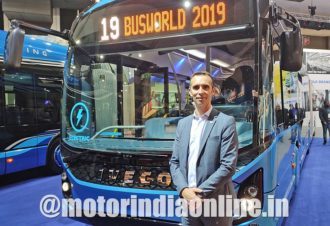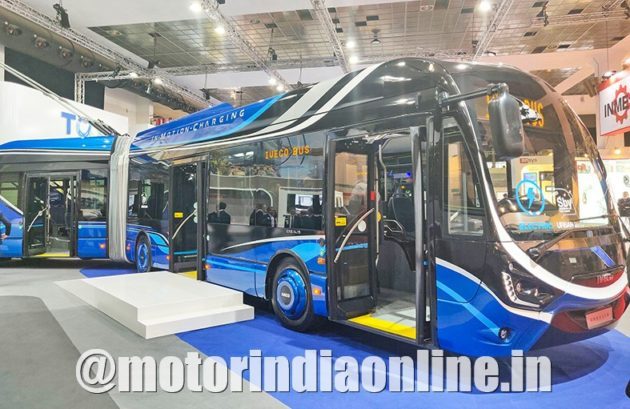With over a century of experience and expertise in manufacturing public transport vehicles in Europe, Iveco Bus continues to thrive on the valuable capital of ideas, innovations and specific know-how. In this exclusive interview, Stephane Espinasse, Head of Iveco Bus Brand Worldwide, reveals to Dhiyanesh Ravichandran the company’s products, marketing strategies and global expansion plans

A brand division of Iveco under CNH Industrial, Iveco Bus is a strong supporter of sustainable mobility, offering a wide range of low-carbon and alternative traction solutions for buses. In the upcoming years, the brand will actively continue to solidify its strong commitment to energy transition, while building fresh strategies for new markets and maintaining the highest levels of excellence in customer service, Excerpts from the interview:
Could you tell us a little bit about Iveco Bus brand, its core values, and manufacturing expertise?
Iveco Bus is one of the leading manufacturers of buses and coaches around the world. As a brand, our mission is to develop collective passenger vehicles to meet the needs of present and future mobility. We are committed to safe, efficient, comfortable and sustainable mobility. Our core values are based on four fundamental pillars, namely, sustainability, technology, total cost of ownership and high value, which together guarantee a relevant competitive advantage and a perfect balance in terms of quality, comfort, design and operating profitability. Iveco Bus has three state-of-the-art manufacturing facilities situated at Annonay in France, Vysoke Myto in the Czech Republic and Suzarra in Italy.
What are all the applications or segments your products cater to?
We are present in all product segments with a wide range of products, including that of city buses, mini-buses, intercity and premium coaches, and bus chassis. Our latest novelties include the ‘Crealis’ model range for BRT, ‘E-Way’ range of electric buses for regular city applications and BRT networks with opportunity charging, and ‘Natural Power’ technology products powered by natural gas and bio-methane fuels, to name a few. We have sold more than 40,000 units of our ‘Crossway’ family of intercity buses across the globe, while our ‘Magelys’ and ‘Evadys’ premium coaches and ‘Daily’ range of minibuses are popular as well.
At Busworld Europe 2019, Iveco Bus featured a full range of low-carbon emission vehicles including electric buses. What is your technology strategy in this regard and how is your brand driving customers towards sustainable mobility?
The bus industry is at a critical phase of energy transition, switching from conventional power systems to that of emission-free sustainable sources of energy. We at Iveco Bus are committed towards energy transition in buses; it has become a reality now with our ‘Natural Power’ solutions and the full range of CNG buses. Natural gas engines have immense market advantages and emission-reduction benefits, which are the best solutions on offer for energy transition. On the other hand, we are ready with electro-mobility as well. At the last Busworld Europe exhibition, we displayed our ‘E-Way’ 18-metre fully electric articulated bus, powered by 160/200 kW electric motors sourcing power from batteries made of LTO cells (lithium titanate oxide).
It boasts of opportunity charging with an on-board pantograph. Two other variants of e-buses are available as well – 9.5 metre and 12 metre. We offer customers a choice in the number of batteries to match their specific requirements. Lastly, our latest generation of diesel engines manufactured by FPT (Fiat Powertrain Technologies) meets Euro 6 Step A standards, powered by HI-SCR after-treatment technologies that are sustainable in the best way possible. That apart, we are already working on hydrogen fuel solutions and will put up products as and when the markets are ready and a business case arises. Thus, our strategy today is to offer superior solutions in diesel, gas, and electric technologies as per customers’ demands.

Considering the global presence of Iveco Bus, which are the core markets or regions that you focus on at present?
We are very well-positioned in different global regions. Iveco Bus is one of the strongest market leaders in Europe – our base and core market – with a sales volume of over 8,500 units every year. Next is South America, where we boast a 5% market-share with minibuses and chassis sales. We also have a dedicated research and development centre in Brazil and a manufacturing centre in Argentina to cater to the specific needs of the region, including that of Central America. That apart, we are strong in some African countries like Somalia, along with some select markets in the Far East region and in Asia as well. We are not present in India yet. As of today, our focus is to develop steady activities and consolidate growth in these markets, more specifically in Europe and South America.
Does that mean that the Asian markets are not on your target list in the immediate future?
As of today, we don’t have the right product line-up to pursue aggressively in the Asian region. Our European products are left-hand-drive variants and meet superior Euro 6 standards, which limits their proposition to these markets. However, there is a good emerging opportunity concerning electro-mobility in Asia, wherein we would be ready to participate and offer our best solutions in city-specific e-mobility projects. We can also extend our class-leading Euro 6 buses in those markets as and when they mature for the same.
Apart from products and technologies, what difference does Iveco Bus strive to make in the industry?
The products that we offer are just a skeleton. As a bus maker, what we offer as service and value-addition to our customers is what matters. With robust after-sales services and finance packages, we are stepping up our ante in connected technologies for bus applications, which can offer unique solutions to our customers by way of fleet management systems and services in pursuit of maximum uptime for our vehicles on road.